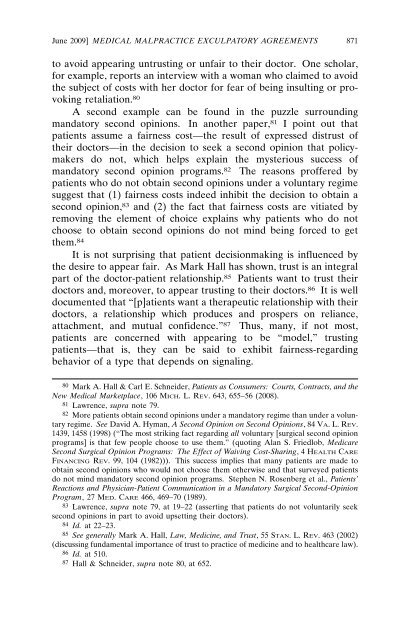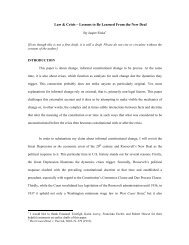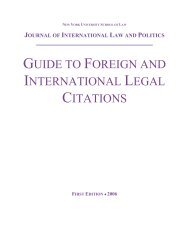In Search of an Enforceable Medical Malpractice Exculpatory
In Search of an Enforceable Medical Malpractice Exculpatory
In Search of an Enforceable Medical Malpractice Exculpatory
Create successful ePaper yourself
Turn your PDF publications into a flip-book with our unique Google optimized e-Paper software.
June 2009] MEDICAL MALPRACTICE EXCULPATORY AGREEMENTS 871<br />
to avoid appearing untrusting or unfair to their doctor. One scholar,<br />
for example, reports <strong>an</strong> interview with a wom<strong>an</strong> who claimed to avoid<br />
the subject <strong>of</strong> costs with her doctor for fear <strong>of</strong> being insulting or provoking<br />
retaliation. 80<br />
A second example c<strong>an</strong> be found in the puzzle surrounding<br />
m<strong>an</strong>datory second opinions. <strong>In</strong> <strong>an</strong>other paper, 81 I point out that<br />
patients assume a fairness cost—the result <strong>of</strong> expressed distrust <strong>of</strong><br />
their doctors—in the decision to seek a second opinion that policymakers<br />
do not, which helps explain the mysterious success <strong>of</strong><br />
m<strong>an</strong>datory second opinion programs. 82 The reasons pr<strong>of</strong>fered by<br />
patients who do not obtain second opinions under a voluntary regime<br />
suggest that (1) fairness costs indeed inhibit the decision to obtain a<br />
second opinion, 83 <strong>an</strong>d (2) the fact that fairness costs are vitiated by<br />
removing the element <strong>of</strong> choice explains why patients who do not<br />
choose to obtain second opinions do not mind being forced to get<br />
them. 84<br />
It is not surprising that patient decisionmaking is influenced by<br />
the desire to appear fair. As Mark Hall has shown, trust is <strong>an</strong> integral<br />
part <strong>of</strong> the doctor-patient relationship. 85 Patients w<strong>an</strong>t to trust their<br />
doctors <strong>an</strong>d, moreover, to appear trusting to their doctors. 86 It is well<br />
documented that “[p]atients w<strong>an</strong>t a therapeutic relationship with their<br />
doctors, a relationship which produces <strong>an</strong>d prospers on reli<strong>an</strong>ce,<br />
attachment, <strong>an</strong>d mutual confidence.” 87 Thus, m<strong>an</strong>y, if not most,<br />
patients are concerned with appearing to be “model,” trusting<br />
patients—that is, they c<strong>an</strong> be said to exhibit fairness-regarding<br />
behavior <strong>of</strong> a type that depends on signaling.<br />
80 Mark A. Hall & Carl E. Schneider, Patients as Consumers: Courts, Contracts, <strong>an</strong>d the<br />
New <strong>Medical</strong> Marketplace, 106 MICH. L. REV. 643, 655–56 (2008).<br />
81 Lawrence, supra note 79.<br />
82 More patients obtain second opinions under a m<strong>an</strong>datory regime th<strong>an</strong> under a voluntary<br />
regime. See David A. Hym<strong>an</strong>, A Second Opinion on Second Opinions, 84 VA. L. REV.<br />
1439, 1458 (1998) (“The most striking fact regarding all voluntary [surgical second opinion<br />
programs] is that few people choose to use them.” (quoting Al<strong>an</strong> S. Friedlob, Medicare<br />
Second Surgical Opinion Programs: The Effect <strong>of</strong> Waiving Cost-Sharing, 4 HEALTH CARE<br />
FINANCING REV. 99, 104 (1982))). This success implies that m<strong>an</strong>y patients are made to<br />
obtain second opinions who would not choose them otherwise <strong>an</strong>d that surveyed patients<br />
do not mind m<strong>an</strong>datory second opinion programs. Stephen N. Rosenberg et al., Patients’<br />
Reactions <strong>an</strong>d Physici<strong>an</strong>-Patient Communication in a M<strong>an</strong>datory Surgical Second-Opinion<br />
Program, 27 MED. CARE 466, 469–70 (1989).<br />
83 Lawrence, supra note 79, at 19–22 (asserting that patients do not voluntarily seek<br />
second opinions in part to avoid upsetting their doctors).<br />
84 Id. at 22–23.<br />
85 See generally Mark A. Hall, Law, Medicine, <strong>an</strong>d Trust, 55 STAN. L. REV. 463 (2002)<br />
(discussing fundamental import<strong>an</strong>ce <strong>of</strong> trust to practice <strong>of</strong> medicine <strong>an</strong>d to healthcare law).<br />
86 Id. at 510.<br />
87 Hall & Schneider, supra note 80, at 652.
















